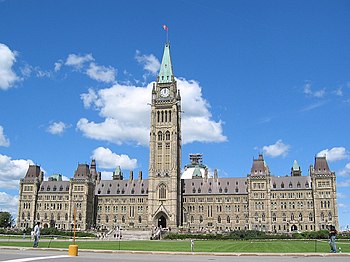 |
| Internal development of Canada's internal borders, from the formation of the dominion to the present. (Photo credit: Wikipedia) |
In a development that has been welcomed by candidates for Canadian immigration through the Express Entry selection system, the latest draw has seen a substantial increase in the number of candidates invited to apply for Canadian permanent residence. This increase means that the number ofComprehensive Ranking System (CRS) points required in order for a candidate to receive an Invitation to Apply (ITA) has decreased for the second draw in a row.
A total of 1,288 candidates in the Express Entry pool with 483 or more CRS points received an ITA in the September 21 draw. Candidates who have been issued an ITA are now in a position to submit an application for Canadian permanent residence. Accompanying family members, including spouses or common-law partners, as well as dependent children, may also come to Canada along with the principal applicant. The government of Canada aims to process applications within six months.
Just four weeks ago, the CRS point requirement was 538 and only 750 candidates were invited to apply. The move towards larger draws, and a corresponding decrease in the CRS point requirement, likely reflects a desire on the part of Immigration, Refugees and Citizenship Canada (IRCC) to issue more ITAs through the fall season, in order to reach the annual intake levels set earlier this year for the federal economic immigration programs that receive applications through Express Entry. An IRCC representative made comments earlier this year to that effect, and it now appears that that prediction is becoming a reality.
With the number of ITAs having increased and the CRS cut-off point going down substantially, many candidates who did not receive an ITA on this occasion remain optimistic about achieving their Canadian immigration goals.
Obtaining an ITA
When the government of Canada published its year-end 2015 Express Entry report, it stated that more than half (57 percent) of candidates who received an ITA in 2015 had Core CRS scores below 450* (Core CRS indicates a candidate’s score without the additional 600 points for a job offer or an enhanced provincial nomination certificate). Many of these selected candidates entered the pool before receiving an enhanced provincial nomination certificate from a Canadian province.
Since Express Entry was first introduced in January, 2015, more and more Provincial Nominee Program (PNP)options have become available to Express Entry candidates. For example, since the previous Express Entry draw took place on September 7, the province of British Columbia (BC) conducted a draw for the British Columbia Provincial Nominee Program (BC PNP). Approximately half of the total 477 candidates for immigration to BC who were invited in that draw were Express Entry candidates who had previously created a profile in the federal Express Entry system. These skilled worker and international graduate candidates are now in a position to obtain a provincial nomination certificate, after which they may be awarded 600 additional CRS points and an ITA in a subsequent draw from the pool.
With many other PNP categories opening and closing quickly (such as Saskatchewan’s International Skilled Worker – Express Entry sub-category) evidence suggests that being ready to apply for such opportunities in advance is key to ultimately receiving an ITA for permanent residence.
There are many potential ways in which candidates may increase their CRS score, and thereby increase their chances of receiving an ITA. For tips for improving Express Entry Comprehensive Ranking System scores, click here.
Taking the opportunity
“The latest developments in Express Entry are very encouraging,” says Attorney David Cohen. “IRCC’s forecast that the number of invitations to apply would increase is coming to fruition, and candidates in the pool continue to have opportunities to obtain additional points, particularly through the Provincial Nominee Programs.
“In addition to the latest positive developments, the government of Canada has made it quite clear that it is looking at increasing the number of immigrants to Canada in 2017 and beyond. Not only that, it has stated that it is looking at options to make changes to the Express Entry system. The exact changes, if and when they happen, are not yet known. Accordingly, individuals who are currently eligible to enter the pool are encouraged to do so. It is only once a candidate is in the pool that he or she may attract the attention of Canadian provinces that are looking to welcome newcomers through a PNP, as well as Canadian employers hiring through the Express Entry system.”
To find out if you are eligible for immigration to Canada, including through the federal economic programs that are processed under Express Entry, please fill out a free online assessment today.
*The lowest CRS cut-off point in any draw that has taken place so far is 450.
Source:
© 2016 CICnews All Rights Reserved





